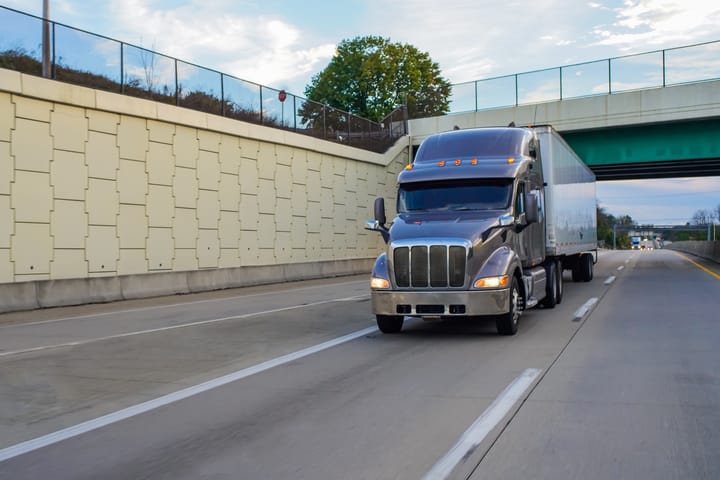Thieves target trucks in motion
Plus: Help for truckers experiencing health issues

Cargo thieves are getting bolder, targeting trucks while they're still in motion. Meanwhile, major carriers are shifting toward dedicated contracts for more stability, and small fleets in California are breathing a sigh of relief as a strict emissions rule is withdrawn.
Plus, long hours on the road make it difficult for truck drivers to manage their health, even for simple tasks like scheduling a doctor’s appointment. That’s why the St. Christopher Truckers Relief Fund was created. We spoke with the organization’s executive director to learn how they, along with fleet managers, are working to support drivers' well-being.

⬆️$3.665
AVG. COST OF DIESEL PER GALLON IN U.S. AS OF 02/10, UP 0.005¢
Source: U.S. Energy Information Administration


Who helps truckers when they get sick? This fund does
Long hours. Limited access to doctors. Rising health risks. Life on the road isn’t easy for truckers—especially when they get sick. That’s where the St. Christopher Truckers Relief Fund steps in. Founded by Dr. John McElligott and two others, the fund helps OTR Class A drivers stay on top of their health, whether they need financial assistance during an illness or preventative care to keep them on the road. We spoke with Donna Kennedy, the fund’s executive director, to learn how it works—and what fleet execs can do to help. -Shefali Kapadia
What does the fund do, and what are its main missions?
If an OTR driver has to come off the road due to illness or injury, we help cover some essential household expenses, including rent, mortgage, utilities, insurance and vehicle payments.
Our second mission is preventative care and health maintenance. We offer programs for nicotine cessation, diabetes prevention and at-home cancer screenings for prostate and colorectal cancer. Colorectal screening is a simple test that provides results within five minutes at home. The prostate test is just as easy—drivers mail in their sample, and we follow up with the next steps if the results indicate a concern.
Why is it important to offer these resources to OTR drivers?
The long hours, sedentary lifestyle and limited access to healthy food make it difficult for truckers to prioritize their health. OTR drivers don’t always know when they’ll be home next, making scheduling a doctor’s appointment incredibly challenging. We aim to make healthcare more accessible and convenient so drivers can get the care they need without disrupting their work.
Aside from sleep apnea, diabetes and obesity, what are some lesser known but common health problems among truck drivers?
We see a high number of skin cancer cases, particularly because truckers are exposed to long hours of sunlight on one side of their body and many do not use sunscreen. Additionally, the constant bumping and jostling of the truck cab has been linked to prostate inflammation. Prostate and colorectal cancer are prevalent among truck drivers.
How can fleet executives and managers help with driver's health and wellbeing?
First, fleet managers need to be aware of the fund and the resources available. If a driver is struggling with quitting smoking, for example, a manager can direct them to our free nicotine replacement program.
We also provide free flyers that fleet executives can print and post at terminals or distribute during onboarding. HR teams can introduce the fund as a complement to the company’s existing wellness programs, ensuring drivers know where to turn for additional support when they need it.
Above: Joshua, a beneficiary of SCF, and his family, who notes, "Thanks to SCF, we were able to keep our water running, electricity on and vehicles from being repossessed. I had a heart attack at a truck stop, [and] I am now going through months of cardiac rehab and am unable to get behind the wheel. Thanks to the Truckers Fund, we were able to make it through the struggle. May God bless them, as He's continued to bless us! Thank Y'all So Much!!" (Courtesy Truckers Fund/Facebook)
This interview was edited for brevity and clarity.

Cargo thieves loot goods from trucks in motion
It's no longer just parked trucks that are at risk for cargo theft. Thieves are starting to enter trailers while trucks are slowed in traffic or stopped at traffic lights, then stealing small but expensive items like electronics while the truck is moving, according to supply chain security firm Overhaul. With reports of this tactic happening along the East and West coasts, Overhaul advised drivers to contact dispatch and the police and pull over into a well-lit, populated area.
Why this matters: As bad actors, unfortunately, become more sophisticated, fleet execs and drivers have to work even harder to develop methods that protect their loads.
Get more details at Truckers News.

- PROHIBITED PARKING: Driver tased, arrested at Love's
- REVERSE GEAR: GM tells fleet to stop hauling vehicles
- JOB MARKET: Trucking has far fewer workers than thought
- GUILTY VERDICT: Trucker convicted on manslaughter charges

"If you're a small operation, you can't go to a brand name telematics company and demand they change the way they do security." - Ben Wilkens, National Motor Freight Traffic Association
Telematics devices collect and contain plenty of data—making them simultaneously useful and vulnerable to attack. How can fleets, no matter their size, vet the software they buy and secure their systems? Wilkens offers tips and best practices in his interview here.

Carriers push their fleets toward dedicated contracts
Large carriers in the U.S. are moving a bigger portion of their fleets to dedicated contracts, as opposed to the spot market. The reason: Today's spot rates aren't tempting enough to lure carriers to that market.
Why this matters: Dedicated contracts can offer more stability and predictability for carriers and their customers, but they may leave fewer loads available on the spot market for independent trucking firms. (Loadstar)
Calif. fleets relieved by scrapping of CARB's Clean Fleets rule
Small trucking companies in Fresno, California, were pleased to see the California Air Resources Board withdraw its rule phasing out diesel truck sales. One fleet that frequently hauls to Oregon and Nevada said current EV tech can't make the trips in one charge, and the owner worried he'd have to drop those routes and scale back operations.
Why this matters: Many fleet owners say the rule's withdrawal buys more time for EV technology and charging infrastructure to develop, while advocates for clean air say we don't have time to wait. (Fresnoland)
State lawmakers rally for more truck parking spots
Representatives in New Jersey, Pennsylvania and Virginia are introducing various resolutions and bills that, if passed, would add truck parking spots to counter the widespread shortage.
Why this matters: Additional parking spaces would be welcome news for drivers and fleets, especially in busy states in the Northeast and mid-Atlantic. In fact, Pennsylvania has a shortage of about 4,400 truck parking spots. (Land Line)

Thanks for reading today's edition! You can reach the newsletter team at editor@theinsidelane.co. We enjoy hearing from you.
Interested in advertising? Email us at newslettersales@mvfglobal.com
The Inside Lane is curated and written by Shefali Kapadia and edited by Bianca Prieto.





Comments ()